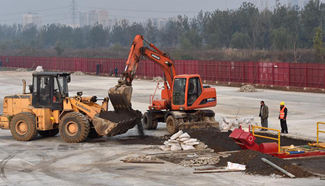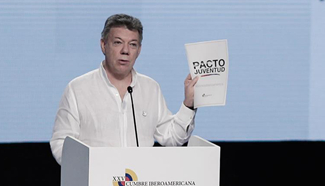BEIJING, Oct. 30 (Xinhua) -- Beijing retiree Zhang Yousen made a lot of money renting out his land in Tongzhou district to lotus root farmers. He makes less now that the land is used for planting trees.
Tree-planting is part of a government plan to create a wetland park around Majuqiao Township, where Zhang, 60, lives.
The park will cover 153 hectares in southeastern Tongzhou, and should be finished before 2020. By then, Tongzhou will have official status as Beijing's "subsidiary administrative center." Tongzhou has become a giant building site with offices, apartment buildings, schools, hospitals and parks springing up all over.
For Zhang, unfortunately, his private interest must give way to more environmentally friendly ways of using land.
Until last year, migrant farmers rented 3,000 square meters of Zhang's land to grow lotus root, a popular vegetable in China.
"Growing lotus root requires heavy use of fertilizer in summer, and salt to prevent the pond water from freezing for the winter. The soil has hardened up and become less fertile," said Zhang.
"If you want to grow something else, you need to plough the soil deeply and restore the fertility of the surface soil," he said.
Before 2012, lotus root growing was quite popular in Tongzhou. In Majuqiao, ponds were built in 16 out of 50 villages. In Tongzhou as a whole, there were over 2,000 hectares of such ponds.
But lotus root consumes too much water, according to Yu Changyang, deputy head of the township.
"Lotus root grows in water at least 20 meters deep and the root requires at least 30 centimeters of mud," said Yu.
"Beijing is too dry and the water evaporates very quickly. One small pond uses at least 20 tonnes of water a year," he said.
One of the world's biggest cities, Beijing is dire need of water. Per capita water resources are only 100 cubic meters, about one twentieth of the national average and one eightieth of the global average.
Getting rid of plants that consume too much water has been a priority. Plants like lotus, rice and wheat have been phased out. It is estimated that in 2015, more than 23 million cubic meters of water were saved in this way in Beijing.
In Majuqiao, there are no lotus root ponds left. In their place are rows of pine trees and magnolias. Reforestation is key to preserving the water in Tongzhou. One tree can preserve 20 cubic meters of water every year. At least nine wetland parks are planned in Tongzhou, covering more than 100 square kilometers.
By 2020, a third of Tongzhou will be covered with forests. "There will be no smelly muddy ponds near my home, but big parks with fresh air and water. It is something I look forward to," said Zhang Yousen.











